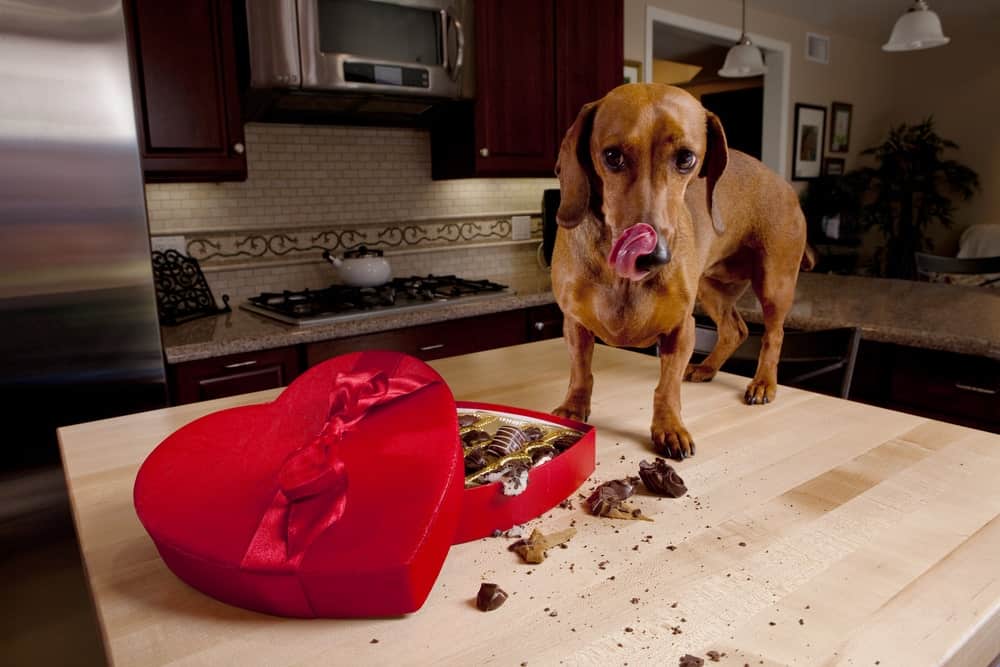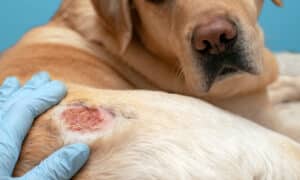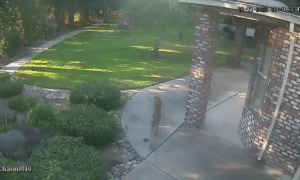“This post contains affiliate links, and I will be compensated if you make a purchase after clicking on my links.”
While you’re celebrating with the loves of your life this Valentine’s Day, be cautious of a dangerous toxin lurking within your chocolate holiday sweets.
Most dog owners are aware that chocolate is a big no-no for dogs. However, the amount and the type of chocolate a dog ingests makes a huge difference in how your dog will be affected by it. While the random chocolate chip in a cookie is usually not an issue, certain kinds of chocolate are highly toxic to pooches.

In most cases, the more bitter and darker the chocolate a dog has ingested, the greater the risk of your dog getting poisoned. The amount of chocolate a dog can ingest without serious adverse effects is relative to the size of the dog as well. Where an 85-pound Labrador may show no reaction to eating a few candies from your heart-shaped box, a 4-pound Chihuahua may be seriously at risk.
The toxicity of chocolates is generally caused by a chemical that’s relative of caffeine known as methylxanthines. This triggers diarrhea, vomiting, lethargy, hyperactivity, increased thirst, agitation, seizures, abnormal heart rate, and sometimes death.
Also, with as low as 20 mg/kg of theobromine, another chemical compound in chocolates that is indigestible to dogs, clinical signs of canine poisoning can already be observed in your pet. Amounts of theobromine ingested that is greater than 40 mg/kg can already result in cardiotoxicity which is characterized by racing heart rates or heart arrhythmias. Worse, if your dog has consumed amounts of chocolate with this chemical greater than 60 mg/kg, neurotoxicity would be a potential risk. A poisoned nervous system can lead to tremors, seizures, and/or even death.
Signs of Chocolate Toxicity in Dogs include:
• Vomiting and Diarrhea – These two problems are the earliest signs of chocolate toxicity in dogs. In light cases, dogs may simply vomit or have diarrhea a few times and then feel better. However, in severe cases, these symptoms may progress further to the others on the list below.
• Excessive Thirst and Urination – Since both theobromine and caffeine are diuretics, found in ALL types of chocolate, dogs may show both excessive thirst and urination when they have ingested too much of either of these substances.
• Restlessness – Caffeine, in particular, may cause dogs to behave restlessly. Darker chocolates with higher caffeine content may lead to this symptom even without the dog ingesting very much of it.
• High Heart Rate – An elevated heart rate is a dangerous symptom that could lead to cardiac arrest, especially in older dogs or those with underlying conditions. It can be difficult to monitor your pet’s heart rate at home, so it may be advised to take your dog to the emergency vet right away for monitoring and/or treatment.
• Seizures – Seizures are one of the most severe symptoms of extreme chocolate toxicity in dogs. This may only occur when a dog has ingested a large quantity of chocolate, but it can sometimes mean the toxicity will become fatal without veterinary treatment. Take your dog to the vet right away if he shows this symptom after eating chocolate.
What You Should Do
Dogs that have finished off small amounts of chocolate may show signs of poisoning in about a day or two while dogs that have eaten large amounts of dark, more toxic chocolates will demonstrate signs of toxicity in just a matter of hours. While both cases require medical attention, the latter is a highly urgent situation that, if not treated right away, could lead to serious life-threatening illnesses.
Treatment generally includes your vet trying to induce vomiting which usually depends on when your pooch has ingested the chocolate, administer activated charcoal numerous times so the toxins pass through the dog’s digestive tract, prescribe anti-nausea drugs, and possibly IV fluids and heart medications.
Don’t forget that with any kind of canine poisoning, it’s always less expensive, less severe, and has a much better outcome if early treatment is done. Since there is no antidote to chocolate poisoning, prevention is always better than cure.
If you know or think your dog has consumed chocolate, call an emergency vet right away. At the Veterinary Emergency Group (VEG), you can speak directly to an emergency veterinarian who will help you with knowing what the next steps are.
There are 18 VEG hospital locations in the U.S. that are open 24/7 and allow pet and pet parents to stay with their pet during all phases of treatment, including surgery and overnight hospitalization. Visit veg.vet to find a location.
Tips to Prevent Chocolate Toxicity in Dogs
• Better Storage – Keep cabinets and pantry doors shut whenever possible and don’t leave chocolate treats or wrappers sitting around.
• Train your pet the “leave it” command to prevent them from grabbing things they shouldn’t, be they edible or inedible.
• Educate Friends and Family not to give your dog any chocolate or other sweets and get them into the habit of storing things in their proper place.
• Always avoid using cocoa shell mulch for your landscaping – often used as a top cover for gardens, its sweet aroma can be attractive to dogs and result in them ingesting some of the mulch, which can cause illness.
























Dog owner
says:You mentioned Bounty Bar in the title, then never again. Yes, darker chocolate is more dangerous, but what about the Bounty Bar? My dog ate one of those.
I totally agree, keep that chocolate far away from the dogs! And if an accident does happen, get them to the vet immediately. Better safe than sorry!
These are some great things to keep in mind, and I especially appreciate your advice to get treatment as quickly as you can. It’s always better to catch a problem as early as you can, so it doesn’t worsen. I just got a puppy, and she likes to get into everything she can, so I’ll keep this information in mind, but hopefully I don’t have to put it to use! Thanks for the great post!
Jill
says:My mixed breed 20lb pup knocked a plastic container(with a screw top)containing choc cookies, off the counter, removed the lid and ate 3/4 of the contents along with my 60lb border collie mix. The border collie was fine, the pup got choc poisoning. It was scary. We have to choc proof the house he is like a goat he can get into anything!
ilene
says:when I was a kid we used to toss the dog Hershey kisses, etc. with no ill effects, nowadays we are told different. If you love your dog as I know you do why bother taking the chance. They shouldn’t have the sugar or most people food anyway. I’m sure you have plenty of dog treats at home that he/she would like just as much.
Grant
says:My 6 pound chi got on the counter while I was at work on day and ate 2 bags of M&M’s with no problem.
Sophia99
says:But you were very very lucky! Just because the dog didn’t get sick it should have been taken to the Vets!
Rob
says:The milk chocolate most people eat doesn’t contain that much cocoa. Us chocolate connoisseurs, however, eat the 70-90 percent dark chocolate that has a slight bitter taste. Dark chocolate has much more cocoa, very good for humans, but very bad for dogs.
Nicky F
says:Recently, my diabetic dog ate a bag of milk chocolate and nuts (don’t ask…it was my fault). Be aware that chocolate can cause many problems….as my vet bill will attest. It’s certainly not something you want to offer.
Vet said it is a myth. Our dogs love chocolate. Does them no more harm than it does people. To get enough ‘toxin’ would require eating many pounds of chocolate. Perhaps an issue for a tiny dog or person who gorges on ultra dark chocolate.
Pam Conrad
says:Your vet is wrong and should not tell anyone such misinformation.
sally wallis
says:One of my dogs once stripped all of the chocolate decorations off the Christmas tree and ate them with no ill effects. The same dog managed to open the cupboard and steal and eat a large bar of Galaxy chocolate – again with no ill effects. I know of many other cases of dogs eating large amounts of chocolate, and I don’t know of any that have been ill or died. I would imagine that it could be dangerous for a diabetic dog, in the same way aas it wouldn’t be good for a diabetic human, but I am concerned that the threat is overstated.
Jennifer
says:My friend’s 90 pound dog died after eating part of a bag of milk chocolate. Anyone who tells you it isn’t dangerous is lying. No a chocolate chip isn’t going to kill them but would you drink bleach?
Sophia99
says:No it is Not!
sarah
says:It really depends on the kind and amount of chocolate. A coworker of mine had a small dog that got into a container of baking chocolate and died after eating only two squares. It’s always better to be safe than sorry in my mind. Why would you risk it?
Sophia99
says:You Vet is a quack then. Your dogs lives are at risk and you are too ignorant to pay attention to the real Professionals!